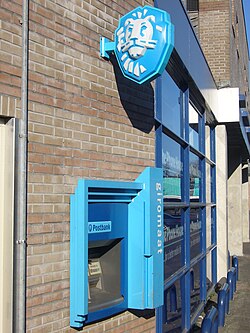Postbank (Pacitalia)
 | |
 | |
| Postbank | |
| Public utility | |
| Industry | Financial services |
| Founded | July 12, 2011 |
Area served | |
Key people |
|
| Products | |
| Revenue | |
| Total assets | |
| Total equity | |
| Owner | Pacitalian government (100%) |
Number of employees | |
| Website | postbank |
Postbank, legally registered as Banco Repubblicana Postale degli Risparmi (Republican Postal Savings Bank) is a Pacitalian postal bank headquartered in Timiocato. It is the sixth-largest bank in Pacitalia by assets as of 2022.
The bank is 100 percent owned by the Pacitalian government, and administered as a subsidiary of Corriere Nazionale, the state-owned postal service. Unlike other large banks in Pacitalia, Postbank is not involved in investment or commercial banking, focusing solely on personal banking products and services. In-person services are offered in the majority of post offices to varying extents, but Postbank uses a direct banking model, eschewing dedicated physical premises in favour of online banking, telephone banking, and cashpoints.
Postbank was established by the government in 2011 as part of a long-awaited return of postal banking services for Pacitalians. The previous postal bank, Banco Postale, operated until 1994, when it was shuttered by the Santo Ragazzo government; its assets were acquired by Banco di Mandragora.
Between 1994 and 2010, Pacitalia did not provide a public banking option. As part of its attempts to resolve a two-year long postal strike that began in 2010, the government proposed a new "Postbank" to provide Corriere Nazionale with an additional source of income to counter falling revenues from regular mail and parcel delivery.
The current Postbank was established on July 12, 2011, following the passage of the Communications Act (Amended), 2011, and operations began in 2012 once job action ended and a deal with striking postal workers and their union was finalized.
Postbank operates on an added-value business model, whereby fees are charged for additional services, such as loan applications, bank drafts, wire transfers, and safe deposit box rentals. It does not charge monthly maintenance or annual fees for basic current accounts, savings accounts, or credit cards. As a result, it has grown in popularity among thrifty consumers, as well as the previously "unbanked" and "underbanked" communities, who historically avoided traditional banks and cooperatives. It has become the sixth-largest bank after just a decade of operation.